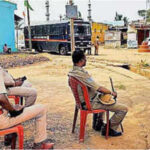The Joint Parliamentary Committee (JPC) for the Waqf Properties (Eviction of Unauthorized Occupants) Amendment Bill 2023 is embarking on a comprehensive tour of five cities across India to gather firsthand insights and perspectives from stakeholders on the proposed legislation. The JPC aims to evaluate the on-ground realities of unauthorized occupation of Waqf properties, assess the grievances of local stakeholders, and engage with state officials, including Waqf Board members and community representatives.
The Waqf Amendment Bill 2023 proposes stringent measures to tackle unauthorized encroachments on Waqf land and properties, a recurring challenge highlighted by both state boards and community organizations. This bill, introduced in the Indian Parliament, grants broader authority to Waqf Boards to identify and reclaim occupied properties, enhancing the boards’ ability to manage these religious endowments effectively. The legislation aims to simplify eviction procedures, empowering Waqf Boards to bypass the lengthy judicial process previously required, and adopt a direct, administrative route to expedite the recovery of encroached lands. Additionally, the bill seeks to impose fines and penalties on unauthorized occupants, creating a deterrent against further encroachment.
This field visit marks a significant move, as it demonstrates the government’s intention to bring a balanced and inclusive approach to the legislation by addressing concerns directly through stakeholder engagement. The selection of these cities, though undisclosed, is based on regions where significant Waqf property disputes and large-scale encroachments have been reported. This approach signals the committee’s recognition of the diverse challenges faced across different regions and reflects an effort to gain localized insights that can shape the bill’s implementation at the state and district levels.
During its consultations, the JPC will meet with representatives of state Waqf Boards, legal experts, and religious leaders to discuss the procedural amendments proposed in the bill. This includes the immediate administrative control being extended to the boards and possible procedural adjustments to ensure due process while addressing illegal encroachments. These discussions are expected to reveal a range of perspectives, particularly from community leaders who have raised concerns over the bill’s broader implications for smaller, community-led religious establishments.
At the heart of the debates is the issue of fair implementation. Various religious and community groups have expressed concerns that without adequate checks, the new powers could lead to misuse or arbitrary actions, impacting those occupying Waqf lands due to long-standing community arrangements. Advocacy groups argue that certain lands, though officially Waqf-owned, have been utilized by communities for decades and hence require a careful, case-by-case assessment before any eviction action is initiated. By bringing these issues into direct dialogue with the JPC, stakeholders hope to influence the inclusion of procedural safeguards within the bill to protect community interests and ensure transparency in its enforcement.
Supporters of the bill, however, argue that the amendments are long overdue, considering the prevalence of illegal occupancy on Waqf properties across various states. They claim that strengthening administrative authority for eviction is crucial to preserve these properties for the intended religious and community welfare purposes. Proponents also suggest that the absence of a streamlined eviction process has limited the effectiveness of Waqf Boards, leading to delays in reclaiming lands that are often essential for funding social welfare projects, schools, and healthcare facilities run by Waqf establishments.



 Violence in Karnataka’s Village Over Waqf Land
Violence in Karnataka’s Village Over Waqf Land 